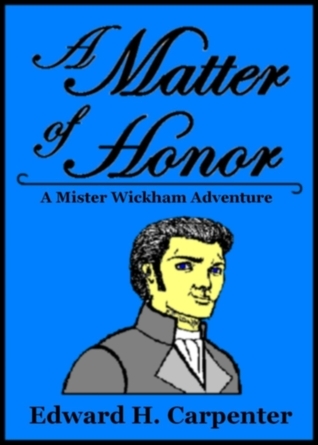Synopsis
In the latter part of the 1800’s, George Wickham, decorated military officer, family man, and pillar of the community was inspired to pen a collection of anecdotes describing his recollections of the events of his life and the nature of English society between 1790 and 1849.
It appears that his motivation to record these narratives came originally from his wife, Lydia Bennet Wickham, who seems to have been distressed at the treatment her husband received by the amateur historiographer of the Bennet family, Miss Jane Austen.
Whatever the reason for creating this history, Wickham himself deemed the account to be too scandalous to be released publicly in his own lifetime, but made arrangements for the texts to be published posthumously, noting in his own words that “a hundred years hence, or thereabouts, even the descendants of our good Prince Regent might be able to read such a tale with a wince and a grin, mourning the sad state of affairs that existed in the United Kingdom of yore, excusing the author his foibles and eccentricities, and finding some amusement in the various sketches of personages and events therein.”
Sadly for the world of literature, Wickham’s narratives, which offer an illuminating counterpoint to the works of his contemporaries such as Miss Austen, were not in fact published in the years after his passing, but instead were lost to posterity, locked away in an archive that has only recently been discovered on the grounds of Cambridge, the venerable institution at which Wickham once studied.
The full text is being edited and prepared for general release to the public, in accordance to what appears to have been Wickham’s final wishes, but I have taken the liberty of releasing this particular account a trifle early, on behalf of the unique value it may have for readers interested in the affairs of those persons whose lives formed the basis for Miss Austen’s historiographical accounts.
In short, this narrative, as recounted by George Wickham, sheds light on an heretofore obscure, but terribly important incident in the lives of the Dashwood sisters, an event that, had it gone differently than it did, might have marred forever any chance at future happiness that those two gentle souls stood to gain by their mutual acquaintance with Colonel Christopher Brandon.
In her history of the Dashwoods, Miss Austen recounts that the Colonel once remarked apocryphally to Elinor Dashwood, in reference to John Willoughby; “we met by appointment, he to defend, I to punish his conduct.”
For an explanation of this cryptic remark, and an account of how the matter was resolved, the following narrative may be of some small use in illuminating this mystery, and is thus presented for your consideration.
Please note that this is a short story, of some 7000 words, and priced accordingly.
It appears that his motivation to record these narratives came originally from his wife, Lydia Bennet Wickham, who seems to have been distressed at the treatment her husband received by the amateur historiographer of the Bennet family, Miss Jane Austen.
Whatever the reason for creating this history, Wickham himself deemed the account to be too scandalous to be released publicly in his own lifetime, but made arrangements for the texts to be published posthumously, noting in his own words that “a hundred years hence, or thereabouts, even the descendants of our good Prince Regent might be able to read such a tale with a wince and a grin, mourning the sad state of affairs that existed in the United Kingdom of yore, excusing the author his foibles and eccentricities, and finding some amusement in the various sketches of personages and events therein.”
Sadly for the world of literature, Wickham’s narratives, which offer an illuminating counterpoint to the works of his contemporaries such as Miss Austen, were not in fact published in the years after his passing, but instead were lost to posterity, locked away in an archive that has only recently been discovered on the grounds of Cambridge, the venerable institution at which Wickham once studied.
The full text is being edited and prepared for general release to the public, in accordance to what appears to have been Wickham’s final wishes, but I have taken the liberty of releasing this particular account a trifle early, on behalf of the unique value it may have for readers interested in the affairs of those persons whose lives formed the basis for Miss Austen’s historiographical accounts.
In short, this narrative, as recounted by George Wickham, sheds light on an heretofore obscure, but terribly important incident in the lives of the Dashwood sisters, an event that, had it gone differently than it did, might have marred forever any chance at future happiness that those two gentle souls stood to gain by their mutual acquaintance with Colonel Christopher Brandon.
In her history of the Dashwoods, Miss Austen recounts that the Colonel once remarked apocryphally to Elinor Dashwood, in reference to John Willoughby; “we met by appointment, he to defend, I to punish his conduct.”
For an explanation of this cryptic remark, and an account of how the matter was resolved, the following narrative may be of some small use in illuminating this mystery, and is thus presented for your consideration.
Please note that this is a short story, of some 7000 words, and priced accordingly.
Moyenne
12.0
1 vote
FAIBLE
1 édition pour ce livre
Qui a lu ce livre ?
1 membre a lu ce livre
Aucun membre ne lit ce livre
Aucun membre ne veut lire ce livre
1 membre possède ce livre
1 chronique de blog
-
 11 Août 2014Jess Swann12 / 20Lire la chronique
11 Août 2014Jess Swann12 / 20Lire la chronique
En vous inscrivant à Livraddict, vous pourrez partager vos chroniques de blog !
commentaire
Pour poster un message, il faut être inscrit sur Livraddict
Aucun commentaire pour le moment.


